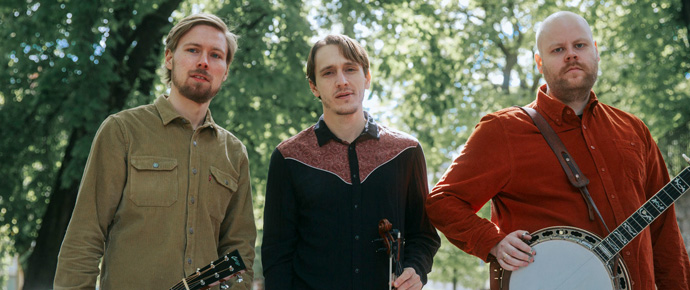
It may seem like an unlikely connection at first, but the ties that bind Scandinavia to the birth of bluegrass are more common than most would think. Many of the settlers that originally arrived in Appalachia came from those nordic environments bringing their musical traditions with them.
Singer and fiddler Michael Barrett Donovan, a Californian by birth, was reminded of those ties when he was a student at Queen’s College Brooklyn. It certainly seemed like enough of an impetus to form the Oslo-based band Buster Sledge after meeting his wife and resettling in her native Norway. He met his bandmates — guitarist Jakob Folke Ossum and banjo picker Mikael Jonassen — at a bluegrass forum and it quickly became apparent that they shared the same musical tastes and sensibilities. Last September, the three decided to try their hand at playing some traditional bluegrass. Donovan eventually introduced an original song he had written called Square Peg, and immediately, the three found themselves in sync. At that point, the Buster Sledge was born.
“Everyone in our group has being a late-bluegrass-bloomer in common,” Donovan suggests. “Mikael was a fan of ’70s prog rock and jazz fusion — he’s a big Genesis guy — but his whole life changed when picking up the banjo after discovering Béla Fleck in high school. Even though our guitarist Jakob grew up in a home full of Norwegian folk and Bob Dylan, he mainly listened to hard rock, punk, and metal before discovering the playing of Pat Martino and John Scofield. Later, while studying guitar at university, Jakob discovered Bryan Sutton in search of other ways to approach the guitar. After that the ball started rolling and he began to listen to David Grier, Michael Daves, Doc Watson – the list goes on.”
Donavan himself studied classical violin and listened to lots of hard rock and metal before being exposed to the music his dad liked, including Irish tenors like John McCormack, Irish bands such as The Wolfe Tones, and country vocal groups along the lines of The Statler Brothers. When he was in college he borrowed an album called Celebrating 50 Years of Del McCoury from a friend, which is when he heard fiddler Jason Carter for the first time. A few years later, he discovered the playing of Billy Contreras. “I’ve never stopped playing double-stops ever since,” he insists.
In an interview with the Sacramento Bee, Donovan described the group’s sound like this: “We’re a traditionalist group, but we’re also trying to interact with tradition in a way that makes sense to modern people.”
As far as the unlikely name is concerned, Donavan demurs when asked about its origins. “We prefer to keep the origin of the band-name as a mysterious secret,” he responds.
That said, Donovan insists that their audiences have been surprisingly receptive.
“Compared to other similarly-sized countries in Europe, Norway — and especially Oslo — is a great place to play and listen to bluegrass,” he says. “There are a couple of festivals in Norway — the largest of them is called Strenger i Gress — and a monthly concert series which often brings in bands from the U.S. and the rest of Europe to Oslo. It’s called Bluegrassaften Oslo and it’s run by our banjo-player Mikael. As is true about the scene at large, a lot of the audience members are bluegrass players themselves; wherever there is a bluegrass show here in Norway, there is likely going to be an all-night jam session. We’ve had a few of the American groups that have played in our monthly series say that they were surprised by the playing level of Norway’s musicians, as well as the amount of young people participating. We humbly take that as confirmation that there is something happening here.”
As far as reaction to their music is concerned,” Donovan quotes a friend of the band that told them their set took him through the seven stages of grief. “We aspire for that to be a representative review,” he says.
Then again, there are ties that bind the two cultures to a great degree. Donovan points to the fact that there is a shared similarity between bluegrass and Norwegian folk music, in that both genres foster a musical community where both amateurs and professionals can come together and play a common repertoire. The fiddle in particular is an integral element in Norwegian folk music, which boasts a long-standing tradition of fiddlers that play solo in remote parts of the countryside in much the same way as the fiddling tradition originated in Appalachia. As Donovan points out, many of the bowing styles, tunings and patterns are either similar or the same as far as American and Norwegian fiddle music are concerned.
“In the present day, thanks to an international folk scene that frequently puts fiddlers from the Scandinavian, European, and American traditions in the same jams, many musicians that play bluegrass or American fiddle styles music play some Nordic tunes too,” he notes. Every once and a while you can catch a glimpse of it in their playing.
This past January the group recorded nine original songs for their debut album, Spirit. While they have toured in the past, like most groups, their performing schedule has been curtailed due to the pandemic. “We have been performing on a series of short weekly livestream concerts through Facebook, offering three to four original songs each Wednesday,” Dovan explains. “In the physical world, the band has been performing mostly in the surrounding area of our base in Oslo, and our plans for touring this summer are unfortunately not a certainty.
While Buster Sledge hasn’t formally performed with any better known names just yet, they have had opportunities to jam with several seasoned musicians, among them, Peter Rowan, Tony Trischka, Special Consensus, Jeff Scroggins & Colorado, and the Steep Canyon Rangers. As a result, Donovan is quick to note the populist precepts that make bluegrass’ appeal seem so universal.
“Bluegrass is, to the people who love it, a style of music that is acoustic and grounded, community-based, unpretentious, accessible, and personal,” he muses. “It is all of those things in a time when human life is full of technology, anonymity, and a bit of loneliness too.”







